Alex Bledsoe's Blog, page 35
June 13, 2011
Kurosawa meets Eddie LaCrosse
Quite a while ago, I posted the trailer to Akira Kurosawa's crime thriller High and Low, and mentioned it was one of the influences on my novel Dark Jenny. I never got around to explaining that until now.
High and Low is based on one of Ed McBain's "87th Precinct" series of police procedurals, in this case King's Ransom. And although the film changes many of the details of plot and setting to make it work in postwar Japan, the central dilemma remains the same. A wealthy businessman is sent a ransom note saying his son has been kidnapped, but it's actually the son of his chauffer, taken by mistake. Does he pay the ransom anyway, even if it means financial and professional ruin?
But it wasn't the plot of High and Low that influenced my novel, it was its structure. The first hour of the film takes place in the businessman's apartment, mostly in the living room that overlooks greater Tokyo, making it the "high" of the title. The claustrophobia adds to the tension, as Kurosawa invokes the sense of evil forces watching from below in the labyrinthine streets. The police must crawl on the floor to avoid being seen at the windows, and each time the phone rings everyone stops dead.
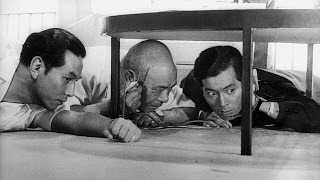
I wanted some of that same vibe in my scenes at Nodlon Castle, which occupy the first fourteen chapters of Dark Jenny. I tried keeping everything in the great hall, but since I'm not Kurosawa, I wasn't quite able to make it work. Still, I hope I conveyed some of the sense of cabin fever, of Eddie trapped within stone walls and ceilings, unable to do much of anything except wait and hope for a break.
SPOILER ALERT! Both for my book and Kurosawa's film!
Once the ransom has been paid, the police are free to use all means at their disposal to track down the kidnappers. The film then turns into a documentary-style chase through the city's rougher sections, the "Low" of the title. It's as different from the spacious, sparsely-furnished apartment as it's possible to be: "a sordid sin-market filled with mixed-race couples and manic frugging, squabbling sailors and cat-eyed slatterns, ravaged junk-zombies and undercover cops from Hell," according to the DVD liner notes by Chuck Stephens.
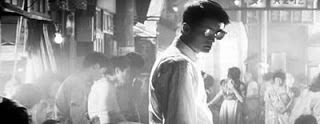
Similarly, when Eddie is finally allowed to leave, he travels across the breadth of the island of Grand Bruan, visiting towns, villages and manor houses all very different from Nodlon Castle. I wanted to get the sense of freedom and relief Eddie feels at finally being allowed to do something, the same way Detective Tokura and his men do in the Kurosawa film.
Part of the fun of writing any Eddie LaCrosse story is finding a way to use influences that are about as far from sword and sorcery as you can get, so working in elements of a sixties Japanese crime thriller appealed to me immensely. It also provided a structure for my faux-Arthurian story that let me deal both with court intrigue and full-on battles without bogging down in either. Without it, Dark Jenny would not have been as lean and fast-paced as I hope it turned out to be.
High and Low is based on one of Ed McBain's "87th Precinct" series of police procedurals, in this case King's Ransom. And although the film changes many of the details of plot and setting to make it work in postwar Japan, the central dilemma remains the same. A wealthy businessman is sent a ransom note saying his son has been kidnapped, but it's actually the son of his chauffer, taken by mistake. Does he pay the ransom anyway, even if it means financial and professional ruin?
But it wasn't the plot of High and Low that influenced my novel, it was its structure. The first hour of the film takes place in the businessman's apartment, mostly in the living room that overlooks greater Tokyo, making it the "high" of the title. The claustrophobia adds to the tension, as Kurosawa invokes the sense of evil forces watching from below in the labyrinthine streets. The police must crawl on the floor to avoid being seen at the windows, and each time the phone rings everyone stops dead.

I wanted some of that same vibe in my scenes at Nodlon Castle, which occupy the first fourteen chapters of Dark Jenny. I tried keeping everything in the great hall, but since I'm not Kurosawa, I wasn't quite able to make it work. Still, I hope I conveyed some of the sense of cabin fever, of Eddie trapped within stone walls and ceilings, unable to do much of anything except wait and hope for a break.
SPOILER ALERT! Both for my book and Kurosawa's film!
Once the ransom has been paid, the police are free to use all means at their disposal to track down the kidnappers. The film then turns into a documentary-style chase through the city's rougher sections, the "Low" of the title. It's as different from the spacious, sparsely-furnished apartment as it's possible to be: "a sordid sin-market filled with mixed-race couples and manic frugging, squabbling sailors and cat-eyed slatterns, ravaged junk-zombies and undercover cops from Hell," according to the DVD liner notes by Chuck Stephens.

Similarly, when Eddie is finally allowed to leave, he travels across the breadth of the island of Grand Bruan, visiting towns, villages and manor houses all very different from Nodlon Castle. I wanted to get the sense of freedom and relief Eddie feels at finally being allowed to do something, the same way Detective Tokura and his men do in the Kurosawa film.
Part of the fun of writing any Eddie LaCrosse story is finding a way to use influences that are about as far from sword and sorcery as you can get, so working in elements of a sixties Japanese crime thriller appealed to me immensely. It also provided a structure for my faux-Arthurian story that let me deal both with court intrigue and full-on battles without bogging down in either. Without it, Dark Jenny would not have been as lean and fast-paced as I hope it turned out to be.
Published on June 13, 2011 03:14
June 7, 2011
Blinded by the Dark: chiaroscuro and Eddie LaCrosse
Recently a reviewer was kind enough to say this about my latest novel:
"Dark Jenny is a fast-paced mystery with plenty of action; it's also intelligent, original, and satisfyingly chiaroscuro."
You don't encounter the word "chiaroscuro" every day, and several readers asked me what it meant. Quoting from Webster, it's a "pictorial representation in terms of light and shade without regard to color." In other words, it's the use of darkness to let you see the light, and vice versa.
I first encountered the term with regards to one of my favorite genres, film noir. It's a great example of turning a flaw into an asset. Many of these movies were shot on very low budgets, which often meant cheap sets. To disguise this, the cinematographers would keep the sets dark, so that their flaws were hidden. Many of these same cinematographers, and the directors they worked for, were also expatriates from Nazi Germany, which meant they learned their craft during the Weimer Republic days of the great Expressionist films like M, Nosferatu, Metropolis and The Golem. This meant that not only did they know how to light for darkness, so to speak, but they knew why.
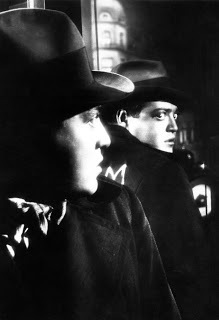
Peter Lorre in M. The film is actually shot in this weird vertical aspect ratio.
Chiaroscuro thrived in black and white film noir. Witness the use of shadows during the fist fight in Out of the Past, or the scene between Jonesy and Canino in The Big Sleep with only their dark silhouettes on the frosted glass. Watch the way Mike Mazurki appears behind Dick Powell in Murder, My Sweet. You could spend the day listing scenes that apply.
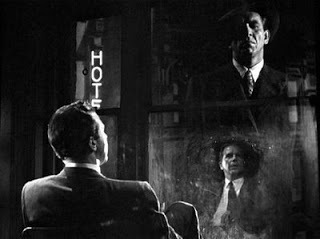
Dick Powell and Mike Mazuski in Murder, My Sweet.
So how does such a visual term translate to prose, specifically to the world of Eddie LaCrosse? It's a modification of the "innocent abroad" trope, in which the moral status of various characters (i.e., their shades of darkness) are made plain against the spiritual and moral purity of the innocent main character. Treasure Island, for example, uses the boy Jim Hawkins as the moral yardstick against which all the other characters are measured.
But in crime and mystery, it goes a step further, in that it allows the reader to interpret not just the people but the world. Raymond Chandler famously said of his genre, "Down these mean streets a man must go who is not himself mean, who is neither tarnished nor afraid." In other words, he is the light going down the streets of darkness (no Biblical reference intended).
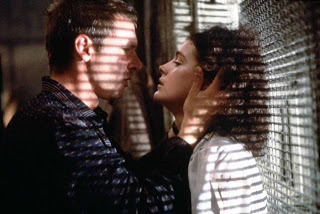
Harrison Ford and Sean Young in Blade Runner, which transposes chiaroscuro to the future.
That's how I see Eddie, and how I hope he's used in the stories. He's not mean in the sense Chandler uses the word (both vicious and ignoble), but he has been in the past, and he knows how easy it is to cross that line. He's tarnished, certainly, but he's in the process of polishing that away. And he's not afraid of the walk, although he has sense enough to be scared of what might live in the shadows he passes through.
Without his light, we could never see what dwells in the shadows. And without the shadows, we'd never know the value of the light, of the hero, of our guy Eddie. And that's how chiaroscuro fits into the world of Eddie LaCrosse.
"Dark Jenny is a fast-paced mystery with plenty of action; it's also intelligent, original, and satisfyingly chiaroscuro."
You don't encounter the word "chiaroscuro" every day, and several readers asked me what it meant. Quoting from Webster, it's a "pictorial representation in terms of light and shade without regard to color." In other words, it's the use of darkness to let you see the light, and vice versa.
I first encountered the term with regards to one of my favorite genres, film noir. It's a great example of turning a flaw into an asset. Many of these movies were shot on very low budgets, which often meant cheap sets. To disguise this, the cinematographers would keep the sets dark, so that their flaws were hidden. Many of these same cinematographers, and the directors they worked for, were also expatriates from Nazi Germany, which meant they learned their craft during the Weimer Republic days of the great Expressionist films like M, Nosferatu, Metropolis and The Golem. This meant that not only did they know how to light for darkness, so to speak, but they knew why.

Peter Lorre in M. The film is actually shot in this weird vertical aspect ratio.
Chiaroscuro thrived in black and white film noir. Witness the use of shadows during the fist fight in Out of the Past, or the scene between Jonesy and Canino in The Big Sleep with only their dark silhouettes on the frosted glass. Watch the way Mike Mazurki appears behind Dick Powell in Murder, My Sweet. You could spend the day listing scenes that apply.

Dick Powell and Mike Mazuski in Murder, My Sweet.
So how does such a visual term translate to prose, specifically to the world of Eddie LaCrosse? It's a modification of the "innocent abroad" trope, in which the moral status of various characters (i.e., their shades of darkness) are made plain against the spiritual and moral purity of the innocent main character. Treasure Island, for example, uses the boy Jim Hawkins as the moral yardstick against which all the other characters are measured.
But in crime and mystery, it goes a step further, in that it allows the reader to interpret not just the people but the world. Raymond Chandler famously said of his genre, "Down these mean streets a man must go who is not himself mean, who is neither tarnished nor afraid." In other words, he is the light going down the streets of darkness (no Biblical reference intended).

Harrison Ford and Sean Young in Blade Runner, which transposes chiaroscuro to the future.
That's how I see Eddie, and how I hope he's used in the stories. He's not mean in the sense Chandler uses the word (both vicious and ignoble), but he has been in the past, and he knows how easy it is to cross that line. He's tarnished, certainly, but he's in the process of polishing that away. And he's not afraid of the walk, although he has sense enough to be scared of what might live in the shadows he passes through.
Without his light, we could never see what dwells in the shadows. And without the shadows, we'd never know the value of the light, of the hero, of our guy Eddie. And that's how chiaroscuro fits into the world of Eddie LaCrosse.
Published on June 07, 2011 03:15
June 6, 2011
Win an ARC of THE HUM AND THE SHIVER
Curious about my next book, The Hum and the Shiver? Here's your chance to check it out before it hits shelves. I have five advance reader copies; leave a comment on this blog post before midnight Sunday, June 12 for chance to win one. Be sure and leave an e-mail with your comment.Here's the video teaser trailer to wet your whistle:
Published on June 06, 2011 03:14
Win an ARC of THE HUM AND THE SHIVER
Curious about my next book, The Hum and the Shiver? Here's your chance to check it out before it hits shelves. I have five advance reader copies; leave a comment on this blog post before midnight Sunday, June 12 for chance to win one. Be sure and leave an e-mail with your comment.
Here's the video teaser trailer to wet your whistle:

Here's the video teaser trailer to wet your whistle:
Published on June 06, 2011 03:14
May 30, 2011
The "Don't Say Gay" bill and being "tender-hearted" in TN

So Tennessee, my home state and the setting of many of my stories and novels, has again made the national news. The State Senate passed a law dubbed the "Don't Say Gay" bill which outlaws even mentioning the existence of gay people in elementary and middle school. I doubt this also includes not mentioning the various slurs and code words Tennesseans have always used for gay folks; in fact, I'm sure the sponsors of the bill often employed those terms in closed-door meetings prior to presenting the bill, right after the opening prayer.
As a child with little aptitude in sports and an interest in literature, science fiction and movies, my schoolmates often teased me with those same slurs. A cousin, in fact, once taunted me with some of them for reading Star Trek: Log Five, just before he beat me up. The fact that I wasn't gay didn't particularly matter, as it never does in such situations. But it was, and remains, the way kids often are, and while I disapprove of it I also comprehend the reasons for it, especially in the South.
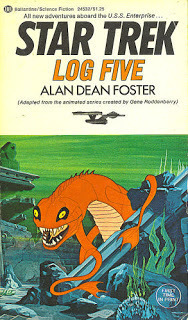
Still, it was nothing compared to the contempt adults showed for kids they deemed "different," "odd" or "weird," and that included a term of such surpassing brilliance that I still marvel at it: tender-hearted. It sounds almost like a compliment, much as does "Bless your heart," which is now generally known to be Southern code for, "You're so stupid." In the same way, "tender-hearted" is code for "gay." Or more precisely, it's synonymous with one of the pithier terms used to derisively describe gay males.
The first time I cursed (we called it "cussed") in front of other people got the term "tender-hearted" applied to me. When I was about ten or eleven, some older good ol' boys dragged a turtle from a pond and cut off its head in their driveway for no reason other than to do it. I told them I found it ignorant and cruel, and when they laughed at me for that, I let fly with every curse word I knew. I was also so mad I started crying. Between the tears and the general knowledge that I liked to read books, I was quickly pegged as "tender-hearted," and to this day (nearly forty years later) the people in my home town still think of me that way.
So the "Don't Say Gay" bill disappoints and saddens me, but it doesn't surprise me. Good ol' Tennesseans have a long tradition of not saying "gay." Instead, depending on the situation, they either use slurs or euphemisms, as they do for everything else. Bless their hearts.

(Please visit and support It's Okay to be Takei, George "Mr. Sulu" Takei's brilliant response to the Tennessee law.)
Published on May 30, 2011 02:51
May 23, 2011
Mamet's Theatre: an extended whine
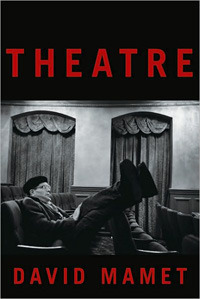 Recently I had the unmitigated pleasure of discovering Beginnings, playwright/screenwriter Horton Foote's memoir of his years as a young man in the theater. It started me on a little run of books about American theatrical thought, such as an immense collection of Lee Strasberg lectures, and made me eager to see a live theatrical performance, something I haven't done in a while. Then I came across David Mamet's recent book Theatre. I may never go see a play again.Mamet, like Foote, is a Pulitzer Prize-winning playwright (Glengarry Glen Ross) and a successful screenwriter (The Untouchables, Hoffa). But there the similarities end. Beginnings was a warm, kind tale of people devoted to their art; Theatre, supposedly the culmination of Mamet's forty years in the trade, feels like the extended whine of an entitled old man who thinks that not enough people listen to him. In it, Mamet comes across as a combination of South Park's Eric Cartman and Patrick Swayze's "My way or the highway" speech from Road House.I've never been a theatrical person, so my first-hand knowledge is limited. Still, the contempt Mamet shows for anyone who thinks differently than he does shoots way beyond arrogance into a kind of pathological egotism that must originate from some childhood humiliation. It's not just, "This is my way, and it works for me," it's "This is my way, and it's the only way that works, so shut the fuck up and listen."Here's is a typical passage:"But there is no inner life of the character, as there is no character. The character is only a few words of speech delineated on the page, and that's all there is--and the Method's concern with the character differs not at all from the daydreams of a twelve-year-old girl, e.g., 'I wonder what Rhett Butler would do if he lived now?'"As a writer, I can understand the wariness with which he approaches those involved in producing his plays (actors, directors, designers, etc.). I sometimes feel the same way about editors, marketing departments, and so forth. The difference is, I recognize the value of their jobs. Mamet never does. For him theater begins and ends with the play's text; directors are next to useless, and I suspect if he could get rid of actors somehow, he would. He certainly doesn't want their input: "The actor's true talent and job is...to stand still and say the words--in order to accomplish something like the purpose indicated by the author." And the fear behind this minimizing of actors? Rejection. "The persistence of an interest in the inner life of the character is a form of deconstructionism, which is to say a rejection of the text." His text.The pragmatist in me wants to agree with many of his tenets, but they come laced with such vitriol that I instinctively side with those he chastises. Even a bully who's right is still a bully. The contempt laced through Theatre must come from a place of supreme, intractable unhappiness that no amount of success will ever ameliorate. I feel sorry for the guy, because I doubt he's ever enjoyed any of his success the way Horton Foote clearly did (and God only knows what Mamet thinks of Foote). Still, none of this is surprising for a man bitter and misanthropic enough to write Glengarry Glen Ross and Oleanna. In the commentary for the Hoffa DVD, director Danny DeVito relates the following joke (paraphrased by me):An English professor comes out of a Broadway show and is approached by a bum asking for change. The professor haughtily says, "'Neither a borrower nor a lender be.' William Shakespeare." The bum replies, "Yeah? 'Fuck you.' David Mamet."Yep. Fuck you, indeed. That's the core statement at the heart of Mamet's theatre, and Mamet's Theatre.
Recently I had the unmitigated pleasure of discovering Beginnings, playwright/screenwriter Horton Foote's memoir of his years as a young man in the theater. It started me on a little run of books about American theatrical thought, such as an immense collection of Lee Strasberg lectures, and made me eager to see a live theatrical performance, something I haven't done in a while. Then I came across David Mamet's recent book Theatre. I may never go see a play again.Mamet, like Foote, is a Pulitzer Prize-winning playwright (Glengarry Glen Ross) and a successful screenwriter (The Untouchables, Hoffa). But there the similarities end. Beginnings was a warm, kind tale of people devoted to their art; Theatre, supposedly the culmination of Mamet's forty years in the trade, feels like the extended whine of an entitled old man who thinks that not enough people listen to him. In it, Mamet comes across as a combination of South Park's Eric Cartman and Patrick Swayze's "My way or the highway" speech from Road House.I've never been a theatrical person, so my first-hand knowledge is limited. Still, the contempt Mamet shows for anyone who thinks differently than he does shoots way beyond arrogance into a kind of pathological egotism that must originate from some childhood humiliation. It's not just, "This is my way, and it works for me," it's "This is my way, and it's the only way that works, so shut the fuck up and listen."Here's is a typical passage:"But there is no inner life of the character, as there is no character. The character is only a few words of speech delineated on the page, and that's all there is--and the Method's concern with the character differs not at all from the daydreams of a twelve-year-old girl, e.g., 'I wonder what Rhett Butler would do if he lived now?'"As a writer, I can understand the wariness with which he approaches those involved in producing his plays (actors, directors, designers, etc.). I sometimes feel the same way about editors, marketing departments, and so forth. The difference is, I recognize the value of their jobs. Mamet never does. For him theater begins and ends with the play's text; directors are next to useless, and I suspect if he could get rid of actors somehow, he would. He certainly doesn't want their input: "The actor's true talent and job is...to stand still and say the words--in order to accomplish something like the purpose indicated by the author." And the fear behind this minimizing of actors? Rejection. "The persistence of an interest in the inner life of the character is a form of deconstructionism, which is to say a rejection of the text." His text.The pragmatist in me wants to agree with many of his tenets, but they come laced with such vitriol that I instinctively side with those he chastises. Even a bully who's right is still a bully. The contempt laced through Theatre must come from a place of supreme, intractable unhappiness that no amount of success will ever ameliorate. I feel sorry for the guy, because I doubt he's ever enjoyed any of his success the way Horton Foote clearly did (and God only knows what Mamet thinks of Foote). Still, none of this is surprising for a man bitter and misanthropic enough to write Glengarry Glen Ross and Oleanna. In the commentary for the Hoffa DVD, director Danny DeVito relates the following joke (paraphrased by me):An English professor comes out of a Broadway show and is approached by a bum asking for change. The professor haughtily says, "'Neither a borrower nor a lender be.' William Shakespeare." The bum replies, "Yeah? 'Fuck you.' David Mamet."Yep. Fuck you, indeed. That's the core statement at the heart of Mamet's theatre, and Mamet's Theatre.
Published on May 23, 2011 03:36
Mamet's Theatre: an extended whine

Recently I had the unmitigated pleasure of discovering Beginnings, playwright/screenwriter Horton Foote's memoir of his years as a young man in the theater. It started me on a little run of books about American theatrical thought, such as an immense collection of Lee Strasberg lectures, and made me eager to see a live theatrical performance, something I haven't done in a while. Then I came across David Mamet's recent book Theatre. I may never go see a play again.
Mamet, like Foote, is a Pulitzer Prize-winning playwright (Glengarry Glen Ross) and a successful screenwriter (The Untouchables, Hoffa). But there the similarities end. Beginnings was a warm, kind tale of people devoted to their art; Theatre, supposedly the culmination of Mamet's forty years in the trade, feels like the extended whine of an entitled old man who thinks that not enough people listen to him. In it, Mamet comes across as a combination of South Park's Eric Cartman and Patrick Swayze's "My way or the highway" speech from Road House.
I've never been a theatrical person, so my first-hand knowledge is limited. Still, the contempt Mamet shows for anyone who thinks differently than he does shoots way beyond arrogance into a kind of pathological egotism that must originate from some childhood humiliation. It's not just, "This is my way, and it works for me," it's "This is my way, and it's the only way that works, so shut the fuck up and listen."
Here's is a typical passage:
"But there is no inner life of the character, as there is no character. The character is only a few words of speech delineated on the page, and that's all there is--and the Method's concern with the character differs not at all from the daydreams of a twelve-year-old girl, e.g., 'I wonder what Rhett Butler would do if he lived now?'"
As a writer, I can understand the wariness with which he approaches those involved in producing his plays (actors, directors, designers, etc.). I sometimes feel the same way about editors, marketing departments, and so forth. The difference is, I recognize the value of their jobs. Mamet never does. For him theater begins and ends with the play's text; directors are next to useless, and I suspect if he could get rid of actors somehow, he would. He certainly doesn't want their input: "The actor's true talent and job is...to stand still and say the words--in order to accomplish something like the purpose indicated by the author."
And the fear behind this minimizing of actors? Rejection. "The persistence of an interest in the inner life of the character is a form of deconstructionism, which is to say a rejection of the text." His text.
The pragmatist in me wants to agree with many of his tenets, but they come laced with such vitriol that I instinctively side with those he chastises. Even a bully who's right is still a bully. The contempt laced through Theatre must come from a place of supreme, intractable unhappiness that no amount of success will ever ameliorate. I feel sorry for the guy, because I doubt he's ever enjoyed any of his success the way Horton Foote clearly did (and God only knows what Mamet thinks of Foote). Still, none of this is surprising for a man bitter and misanthropic enough to write Glengarry Glen Ross and Oleanna.
In the commentary for the Hoffa DVD, director Danny DeVito relates the following joke (paraphrased by me):
An English professor comes out of a Broadway show and is approached by a bum asking for change. The professor haughtily says, "'Neither a borrower nor a lender be.' William Shakespeare." The bum replies, "Yeah? 'Fuck you.' David Mamet."
Yep. Fuck you, indeed. That's the core statement at the heart of Mamet's theatre, and Mamet's Theatre.
Published on May 23, 2011 03:36
May 16, 2011
Teaser trailer for THE HUM AND THE SHIVER
Here's a glimpse of my next book, The Hum and the Shiver, out this September.
Published on May 16, 2011 03:15
Teaser trailer for THE HUM AND THE SHIVER
Here's a glimpse of my next book, The Hum and the Shiver, out this September.

Published on May 16, 2011 03:15
May 13, 2011
Help the southern storm and flood victims (and get cool swag)!
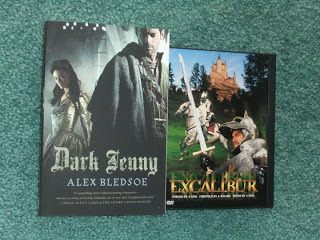
I'm donating both a signed copy of DARK JENNY and my personal DVD of "Excalibur" as part of the HELP WRITE NOW auction to aid victims of the recent southern storms, tornados and floods. Bidding starts at $5!
Published on May 13, 2011 11:32



